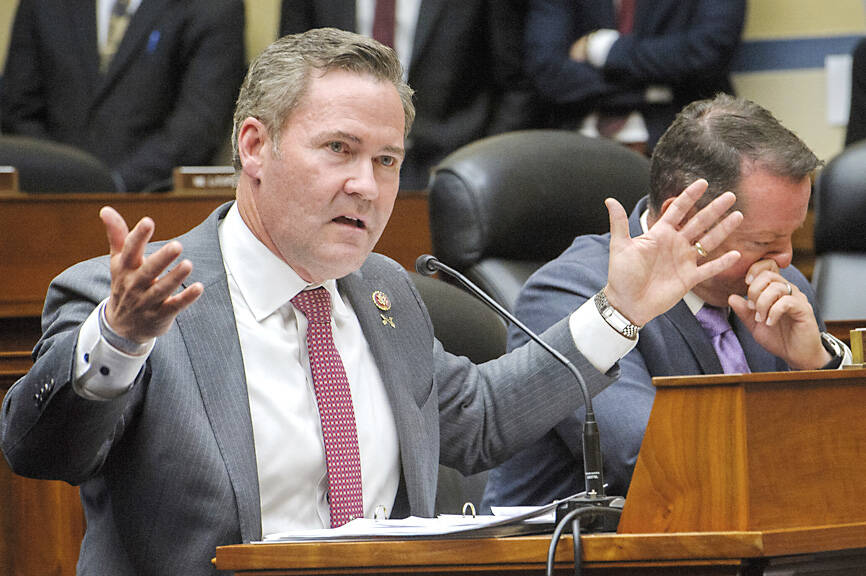US Representative Mike Waltz, who was nominated by US president-elect Donald Trump as national security adviser, recently emphasized the importance of Taiwan in advanced chip production and global trade.
Chinese President Xi Jinping (習近平) has been “openly talking about the decline of America” and “replacing America as a global leader, the decline of Western values,” Waltz said during a Reagan Foundation event in California last month to promote his book, Hard Truths: Think and Lead Like a Green Beret.
Waltz said Xi aims to replace Western values with “essentially a techno surveillance state dictatorship” and described Taiwan as Xi’s “next step” after taking control over Tibet and Hong Kong.

Photo: AP
The lawmaker also warned of the “implications” of China taking over Taiwan.
“Not only would they control 80 percent of the world’s most advanced computer chips, if you look at the geography, they would [also] control the shipping lanes into Japan, South Korea [and] Southeast Asia, [which is] about 50 percent of global GDP,” Waltz said. “The stakes are enormous.”
Waltz, a retired colonel, was the first US Green Beret elected to congress in 2018, after serving multiple tours in Afghanistan, the Middle East and Africa. He is a well-known China hawk who serves in the US House of Representatives’ China Task Force that seeks to address the Chinese Communist Party’s influence.
China has been building its military, and their navy and aerospace forces are now larger than the US’, Waltz said, adding that the Chinese government was “tripling — not just doubling — the size of their nuclear arsenal.”
Future US presidents should not just think in traditional terms of “tank to tank, ship to ship,” but also in terms of cyberattacks — such as those conducted by Volt Typhoon, a state-sponsored hacking group, he said.
Waltz said Volt Typhoon is not just spying, but also putting “cyber time bombs into our system.”
“The first shot in every war game now is fired in space and in cyber,” he added.

The Grand Hotel Taipei on Saturday confirmed that its information system had been illegally accessed and expressed its deepest apologies for the concern it has caused its customers, adding that the issue is being investigated by the Ministry of Justice Investigation Bureau. The hotel said that on Tuesday last week, it had discovered an external illegal intrusion into its information system. An initial digital forensic investigation confirmed that parts of the system had been accessed, it said, adding that the possibility that some customer data were stolen and leaked could not be ruled out. The actual scope and content of the affected data

DO THEY BITE IT? Cats have better memories than people might think, but their motivation is based entirely around the chance of getting fed Cats can remember the identity of the people who fed them the day before, Taipei-based veterinarians said on Friday, debunking a popular myth that cats have a short memory. If a stray does not recognize the person who fed them the previous day, it is likely because they are not carrying food and the cat has no reason to recognize them, said Wu Chou Animal Hospital head Chen Chen-huan (陳震寰). “When cats come to a human bearing food, it is coming for the food, not the person,” he said. “The food is the key.” Since the cat’s attention is on the food, it

‘LIKE-MINDED PARTNER’: Tako van Popta said it would be inappropriate to delay signing the deal with Taiwan because of China, adding he would promote the issue Canadian senators have stressed Taiwan’s importance for international trade and expressed enthusiasm for ensuring the Taiwan-Canada trade cooperation framework agreement is implemented this year. Representative to Canada Harry Tseng (曾厚仁) in an interview with the Central News Agency (CNA) said he was increasingly uneasy about Ottawa’s delays in signing the agreement, especially as Ottawa has warmed toward Beijing. There are “no negotiations left. Not only [is it] initialed, we have three versions of the text ready: English, French and Mandarin,” Tseng said. “That tells you how close we are to the final signature.” Tseng said that he hoped Canadian Prime Minister Mark Carney

President William Lai (賴清德) yesterday bestowed one of Taiwan’s highest honors on Saint Vincent and the Grenadines (SVG) Ambassador Andrea Clare Bowman in recognition of her contributions to bilateral ties. “By conferring the Order of Brilliant Star with Grand Cordon on Ambassador Bowman today, I want to sincerely thank her, on behalf of the Taiwanese people, for her outstanding contribution to deepening diplomatic ties between Taiwan and SVG,” Lai said at a ceremony held at the Presidential Office in Taipei. He noted that Bowman became SVG’s first ambassador to Taiwan in 2019 and